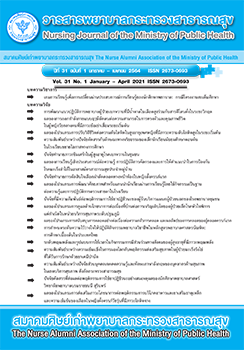Relation between selected variables and the moral characteristics among junior high school students in extended opportunity schools
Main Article Content
Abstract
This research aimed to examine factors related to the moral characteristics among junior high school students in extended opportunity schools. The Stratified random sampling was used to recruit the samples. There included 121 junior high school students in extended opportunity schools from Educational Service Area Office 1, Muang, Chonburi Province. Research instruments consisted of 1) a demographic questionnaire, 2) a parenting styles assessment 3) game addiction screening test 4) the Rosenberg self - esteem scale, and 5) the moral behavior questionnaire. There Cronbach’s alpha reliabilities ranged from .85 - .91. Data were analyzed by using descriptive statistic and Pearson correlation coefficients. The study results showed that the sample’s mean score of moral characteristic was at moderate level (M=3.36, SD=.63). Authoritative parenting style had a high level of positive correlation (r = .56, p <.01) and self-esteem had a positive correlation at the moderate level (r = .43, p <.01), while the neglectful, authoritarian and indulgent parenting styles were negatively related at medium and low levels (r = -. 39, r = -. 37 and r = -. 24, p <.01, respectively). Moreover also found that Internet gaming addiction have a negative relationship at the moderate level (r=- .37, p<.01). These findings suggest that the nurses, teachers, and personnel who work with early adolescents should emphasize on the promotion of authoritative parenting style and self - esteem. Game addiction in youths should be also concerned and watched out. These ways would cultivate moral characteristics and promote psychosocial adaptation in early adolescents.
Article Details
บทความและรายงานวิจัยในวารสารพยาบาลกระทรวงสาธารณสุข เป็นความคิดเห็นของ ผู้เขียน มิใช่ของคณะผู้จัดทำ และมิใช่ความรับผิดชอบของสมาคมศิษย์เก่าพยาบาลกระทรวงสาธารณสุข ซึ่งสามารถนำไปอ้างอิงได้
References
2. Vorasiriamorn Y, Rittirong J, Chuanwan S, Hunchangsith P. IPSR annual report 2014: birth and security in population and society. Nakhon Pathom: Institute for Population and Social Research, Mahidol University; 2014. (in Thai)
3. Dasri S. Causes of aggressive behaviors of the students in the educational opportunity extension schools under Buriram educational service area office 2 [Dissertation]. Buriram: Buriram Rajabhat University; 2012. (in Thai)
4. Sriboonrueng A, Bussaman P. Implementation guidelines development to preventing and solving undesired behavior problems of student’s in expansion schools under the office of Udon thani primary education service area 4. Journal of Education, Mahasarakham University 2018;12(3):248-59. (in Thai)
5. Boonyaprakob V. The development of child and adolescent moral and ethics [internet]. 2014 [cited 2018 Mar 22]. Available from: https://facebook.com/jubjitTU/posts/767507686624962. (in Thai)
6. Bandura, A. Social foundations of thought and action: A social cognitive theory. Englewood Cliffs, NJ:
Prentice-Hall;1986.
7. Thongyoo D. Guideline for Developing Adolescent Self-esteem based on Self-efficacy Theory. Valaya
Alongkorn Review 2014;4(2):179-90. (in Thai)
8. Lee CS, Jang HY. Moderating Effect of Empathy on the Relationship between Self-esteem and Aggression of Adolescents. Journal of Digital Convergence 2018;16(1):47-53.
9. Klaykaew KK. The Role of Families in the fostering and development of children becoming good citizens in a democratic society. Journal of Behavioral Science 2014;20(1):1-18. (in Thai)
10. Baumrind D. Current patterns of parental authority. Developmental Psychology Monongraphs 1971;4:1-103.
11. Fatima S, Dawood S, Munir M. Parenting styles, moral identity and prosocial behaviors in adolescents. Current psychology 2020. doi:10.1007/s12144-020-00609-3.
12. Hilarie C, Cosette DR, Ann HS, Alexander W. Internet addiction: a brief summary of research and practice. Current Psychiatry Reviews 2012;8(4):292–8.
13. Wongpakaran T, Wongpakaran N. Confirmatory factor analysis of Rosenberg self-esteem scale: A study of Thai sample. Journal of the Psychiatrist Association of Thailand 2011;56(1):59-70. (in Thai)
14. Aroonjit N, Ganthong S. Parenting behavior and emotional intelligence of students. Naradhiwas: Prin¬cess of Naradhiwas University;2016. (in Thai)
15. Pornnoppadol C, Sornpaisarn B, Khamklieng K, Pattana-amorn S. The development of game addiction screening test (GAST). Journal of the Psychiatric Association of Thailand 2014;59(1):3-14. (in Thai)
16. Juntipwaree J. Relationships between moral development, moral behavior and aggressive behavior of students in junior high school [Master thesis]. Songkla: Prince of Songkla University; 2015. (in Thai)
17. Tabachnick BG, Fidell LS. Using multivariate statistics. 6th ed. Boston: Pearson; 2013.
18. Bhanthumnavin D. Family strategies for alleviating moral social crisis [internet]. 2014 [cited 2019 Nov 26]. Available from: http://www.km.nida.ac.th/home/images/pdf/3-4.pdf. (in Thai)
19. Sukadaecha R. Child-rearing of Thai families: a systematic integrated literature reviews. Journal of Nursing Science & Health 2020;43(1):1-9. (in Thai)
20. Thawatcharaporn S. The application of Buddhadhamma principle for creating the participation model of the 25th network school in protecting and correcting the online game addiction behavior of the youth. Liberal Arts Review 2018;13(26):90-103. (in Thai)
21. Weaver J. The impact of video games on student Walsh University. Journal of Computer–Mediated Communication 2013;14(1):122-8
22. Wittek CT, Finserås TR, Pallesen S, Mentzoni RA, Hanss D, Griffiths MD, Molde H. Prevalence and predictors of video game addiction: A study based on a national representative sample of gamers. International Journal of Mental Health and Addiction 2016;14(5):672–86.
23. Balci K, Salah AA. Automatic analysis and identification of verbal aggression and abusive behaviors
for online social games. Computers in Human Behavior 2015;53:517–26.

